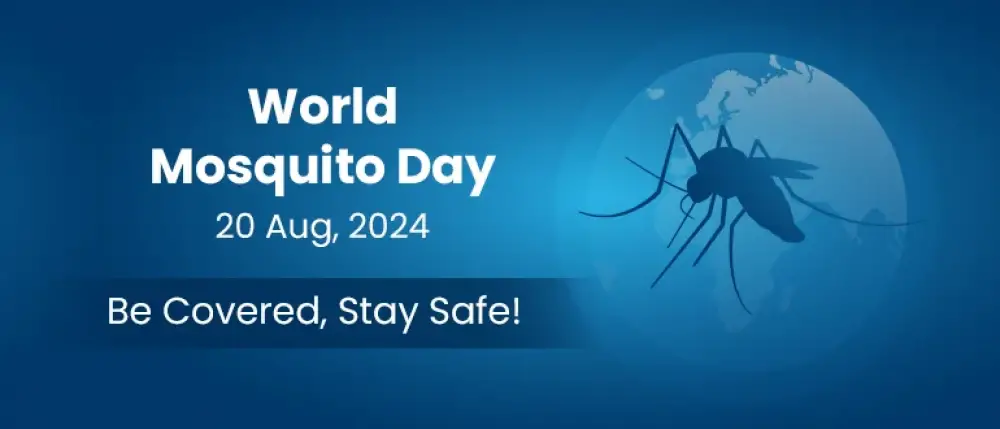Subscribe to get weekly insights
Always stay up to date with our newest articles sent direct to your inbox
Published on 7 Aug, 2024
Updated on 20 Aug, 2025
2477 Views
3 min Read

Written by Mudit Handa
favorite1Like
Did you know that India is home to a whopping 4151 mosquito species? It's bizarre to believe that these tiny creatures pose such a big threat to our health. Mosquitoes are dangerous and capable of transmitting diseases like malaria, dengue, chikungunya, Japanese encephalitis, and lymphatic filariasis. Shockingly, every year, 40 million people in India are affected by mosquito-borne illnesses, with malaria being the most common. These statistics highlight the importance of taking proper measures to protect yourself from these tiny threats! Hence to raise awareness about the threat of mosquito bites, World Mosquito Day is observed every year on Aug 20.
In this blog, you will learn about World Mosquito Day including its history, theme and purpose. Let’s begin.
World Mosquito Day is celebrated in memory of Sir Ronald Ross, a British Doctor who discovered that the female Anopheles mosquito transmits malaria on August 20, 1897. Dr. Ronald Ross named this day as ‘Mosquito Day’. This was the first time a doctor established a connection between a mosquito and malaria. This discovery helped find a prevention and treatment for the disease.
This day is observed to eradicate malaria and save millions of lives. The main purpose behind spreading World Mosquito Day awareness is to,
The World Mosquito Day theme 2024 is “Accelerating the fight against malaria for a more equitable world”. This year’s theme stresses the need to address the gaps in accessing malaria prevention, detection and treatment. Timely diagnosis and treatment can prevent complications and save many lives.
Malaria is the most common yet deadly vector-borne disease caused by a bite from an infected mosquito through which a parasite enters your bloodstream. It is a parasitic disease that is more common in tropical regions with hot and humid climates such as Africa and South Asia.
When a mosquito bites a person infected with malaria, it becomes infected. This infected mosquito can then spread the parasite to a healthy person through its bite, thus spreading the disease.
Symptoms of malaria may be similar to the symptoms of flu and start appearing 10 to 30 days after the infection. Here are some common signs of malaria.
In severe cases, malaria can lead to a patient’s death and in some cases, parasites live in the body for years and do not show any signs.
Prevention mainly involves avoiding mosquito bites. To protect yourself from mosquito bites,
The main treatment includes antimalarial drugs and medication to manage symptoms such as fever, headache, and chest pain. Medicines are prescribed based on the type of parasite causing the infection. It is important to avoid self-medication.
On World Mosquito Day, it is important to understand the impact and burden of mosquito-borne diseases. Access to preventive measures and health care is essential for individuals and communities to stop the spread of the disease. In addition to health care, an affordable health insurance plan is also necessary to protect against medical expenses.
Looking for health insurance that covers you against vector-borne diseases like malaria and dengue? Look no further! Care Health Insurance offers comprehensive plans that ensure access to healthcare services and safeguard you from the risk of getting a mosquito-borne illness. Contact our team today to find the perfect plan for you!
>> Also Read: What is Malaria know its Prevention and Treatment
Disclaimers: The above information is for reference purposes only. Kindly consult your general physician for verified medical advice. The health insurance benefits are subject to policy terms and conditions. Refer to your policy documents for more information.
Thyroid : मामूली नहीं हैं महिलाओं में थायराइड होना, जानें इसके लक्षण और घरेलू उपचार Vipul Tiwary in Diseases
शुगर कंट्रोल कैसे करे? जानें, डायबिटीज में क्या खाना चाहिए Vipul Tiwary in Health & Wellness
हाई ब्लड प्रेशर को तुरंत कंट्रोल कैसे करें? देखें इसके उपाय Vipul Tiwary in Diseases
पैरों में दर्द किस कमी से होता है? जानें, इसके घरेलू इलाज Vipul Tiwary in Health Insurance Articles
World Anaesthesia Day: Role of Anaesthesiology in Health Emergencies Mudit Handa in Awareness Days
11 Top Tourist Destinations to Explore on World Tourism Day Bhawika Khushlani in Awareness Days
World Hepatitis Day 2025: Let’s Overcome the Fear! Mudit Handa in Awareness Days
विश्व जनसंख्या दिवस कब और क्यों मनाया जाता है? Vipul Tiwary in Awareness Days
Always stay up to date with our newest articles sent direct to your inbox
Loading...